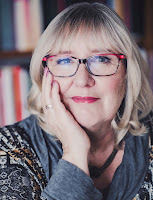 |
| Fenna Williams Photo by Saskia Marloh |
COVID was a killer of people, of joie de vivre, of normality and of much of the cultural life as we knew it in Germany. We had never experienced a world without libraries, theatres, clubs or shops, where we could buy whatever whatever we liked – if we had the money. In fact, a lot of people still had money in these strange times, but no chance to spend it. Even when your own company was forced to close down or cease production and you had to stay at home and twirl your thumb, you could rely on the state to pay you compensation, up to 60% of your net wage. That applied to everyone with a work contract. It left writers, singers, dancers and many
musicians out in the cold. Freelance workers could only ask for welfare if they had used up all their savings beforehand.
Germany is a federal state, and in this particular situation I was lucky to live in the state of Hesse, where the Minister for Science and Art is a woman that belongs to the Green Party. She took about one million pounds and handed them to a trust to which anyone could apply if he or she had an idea for a cultural project that could be realized during the pandemic and was something new or different. The only obstacle: You had to live in Hesse and spend the money there.
When I go on stage with my crime stories, I always have musicians accompany me that support my readings with their songs, thereby giving the evening its own soundtrack. If I choose a crime story set in a Scottish Whisky distillery, ‘500 miles’ or ‘Whiskey in the jar’ is called for. For anything set in Italy, ‘Bello e impossible’ is the hit.
As the audience loves this combination of ‘Crime & Chime’, I wrote a proposal about a crime story anthology as well as a talking book that would contain both the stories and their matching songs. As travelling anywhere, let alone abroad, was absolutely out of the question, I chose a topic that I hoped would make many colleagues want to take part in the project: a journey around the globe in 18 murder stories – infected by the reading virus, but bsolutely COVID-free!
I wanted only female crime writers on the project as they seemed to be hit harder by the pandemic and the problems connected. I got German-speaking women from all over the world to support my idea. From Ireland, the States, from Austria and Italy, as well as women who had lived in Iran, India, Peru, Namibia, or women who simply wanted to write about their favourite country from Greece to Ghana, from Brazil to Australia. I wrote one story set in French Guyana and Suriname, my favourite place in South America.
We began the project even though we did not know it would be chosen – especially as so many of us did not live in Hesse but around the globe. We loved it nevertheless, because, as one of our Sopranos put it:’ ‘Working on the project, far apart, but still together, gave us a purpose. Suddenly the days did not have the stale taste they had before.’
The day the jury announced that 1,400 projects had been handed in until the deadline and Around the World in 18 Murders had been chosen, I waltzed through the house. We got money to write our stories, to go to the recording studio to produce a high-quality sound for the matching MP3 CD. We created a trailer and a making-of. We won over our publishing house of choice, the Leinpfad Verlag, that decided to press our stories between two beautiful covers, complete with illustrations for every continent and country. For our homage to Jules Verne’s Around the World in 80 Days we even had one of the musicians compose a song for us in Hessian dialect to thank the state for supporting not only writers and musicians from their own tiny part of Germany, but from anywhere in the world. The minister herself wrote a foreword which was touching, starting with the famous line ‘It was a dark and stormy night …’
I must admit, I was immensely proud to be the initiator of this project, but was also thankful to have Petra K. Gungl, a mystery writer from Austria, at my side who backed me up with everything and who took the legal aspects in hand. If I ever had a project that came from the heart, it is in ‘18 Murders’. And if you ever read or listen to it, you might find that there are actually 19 stories – because we do have one survivor.
But money was not everything: The experience of working together in friendship and harmony in these strange times was even better. Friendships were formed that I am sure will last. A beacon in the pandemic, one that we made shine by writing us through it.
Fenna Williams studied Fictional and Non-Fictional Creative Writing in Seattle, Frankfurt und Cambridge. She writes short stories, novels and travel essays and edits anthologies. She is both a writing coach and a tour guide and is well known for her mystery series under the pen name Auerbach & Auerbach about translator and house sitter Pippa Bolle for the Ullstein publishing house. www.Fenna-Williams.com

No comments:
Post a Comment